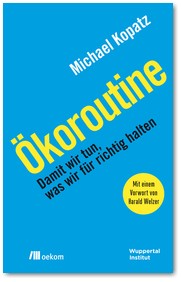Cooperatives and building communities promise affordable and sociable living. But what is everyday life like there?
Read more on the website of the South German Newspaper
Keywords: Stakeholders, Cohousing, DE-News, eG
Cooperatives and building communities promise affordable and sociable living. But what is everyday life like there?
Read more on the website of the South German Newspaper
 The gap between knowledge and action is often wide. At the beginning of his book "Ökoroutine", Michael Kopatz explains why we often don't do what we think is right: out of routine. Because the here and now determines our actions. Because it is difficult to avoid advertising. Or because living sustainably seems more expensive and more inconvenient in everyday life. Why should I, of all people, cycle more often, fly less, spend more money on organic products?
The gap between knowledge and action is often wide. At the beginning of his book "Ökoroutine", Michael Kopatz explains why we often don't do what we think is right: out of routine. Because the here and now determines our actions. Because it is difficult to avoid advertising. Or because living sustainably seems more expensive and more inconvenient in everyday life. Why should I, of all people, cycle more often, fly less, spend more money on organic products?
Keywords:
DE-News, Climate protection, Lifestyle / Consumption, Sustainable management, New books and studies, Sufficiency, Transition Town
What makes a sustainable university? Sustainability Council and 50 university administrations, employees and students are developing a sustainability code for universities. The test phase of the beta version of the university code will start in autumn. In autumn 2014, the German Council for Sustainable Development (RNE) held a stakeholder conference on "From Pilot to Standard: Implementing Sustainability in Research, Teaching and Operations" to discuss the implications [...]
www.nachhaltigkeitsrat.de/...der-nachhaltigkeitskodex-geht-jetzt-an-die-hochschulen
Keywords:
DE-News, University
One advantage of photovoltaics is that they can supply electricity for decades if installed and components are selected correctly. If photovoltaic modules are no longer used to generate solar power due to damage or age, they must be disposed of properly in accordance with the German Electrical and Electronic Equipment Act (ElektroG). After all, they contain valuable raw materials.
"The recycling of solar modules is technically feasible today. Specialised waste management companies can recycle old modules in such a way that the raw materials they contain can be fed almost completely into a production process as secondary raw materials," says Carsten Körnig, Managing Director of the German Solar Industry Association (BSW). "It is therefore important that discarded modules are channelled into the materials cycle. Owners of photovoltaic systems, installers and operators of collection centres can find out where old modules can be handed in and what needs to be considered in our new information sheet."
For example, modules from private households can be disposed of free of charge at designated collection points such as recycling centres or the take-back centres of manufacturers and distributors. "As an electrical voltage is generated when light falls on the active cell layer in photovoltaic modules, it is important to handle dismantled modules for disposal with care," says Körnig. For example, module cables should be secured, modules should be carefully stacked and, if necessary, provided with edge protection. "The solar-active side of the module should always face downwards when stacking, and open contacts and damaged backsheets should be insulated before removal."
More than 1.7 million photovoltaic systems are in operation in Germany. Under normal conditions, a photovoltaic module can reliably supply climate-friendly electricity for at least 25 years, and usually much longer. The industry association therefore does not expect to see a large number of old modules for a good ten years.
The free information paper "Safe handling of old PV modules" is available at
www.solarwirtschaft.de/fileadmin/user_upload/bsw_hinweispap_altmodule.pdf
Keywords:
100% EEs, DE-News, Renewable, Climate protection, Sustainable management, New books and studies, PV, Recycling, Resource efficiency, Environmental policy
Soil is sealed with every new building and land for nature is thus used up. The German government now wants to more than halve land consumption over the next few years. Nicola Brockmüller from the Schleswig-Holstein Nature Conservation Foundation explains on DLF that this is also a good way of cooling the earth's climate and preventing flooding.
To the article from 10.8.2016 at Deutschlandfunk
Keywords:
Soil & land consumption, DE-News, Quarters, SDG 2030, Settlements, Transition Town, Environmental policy, Ecology